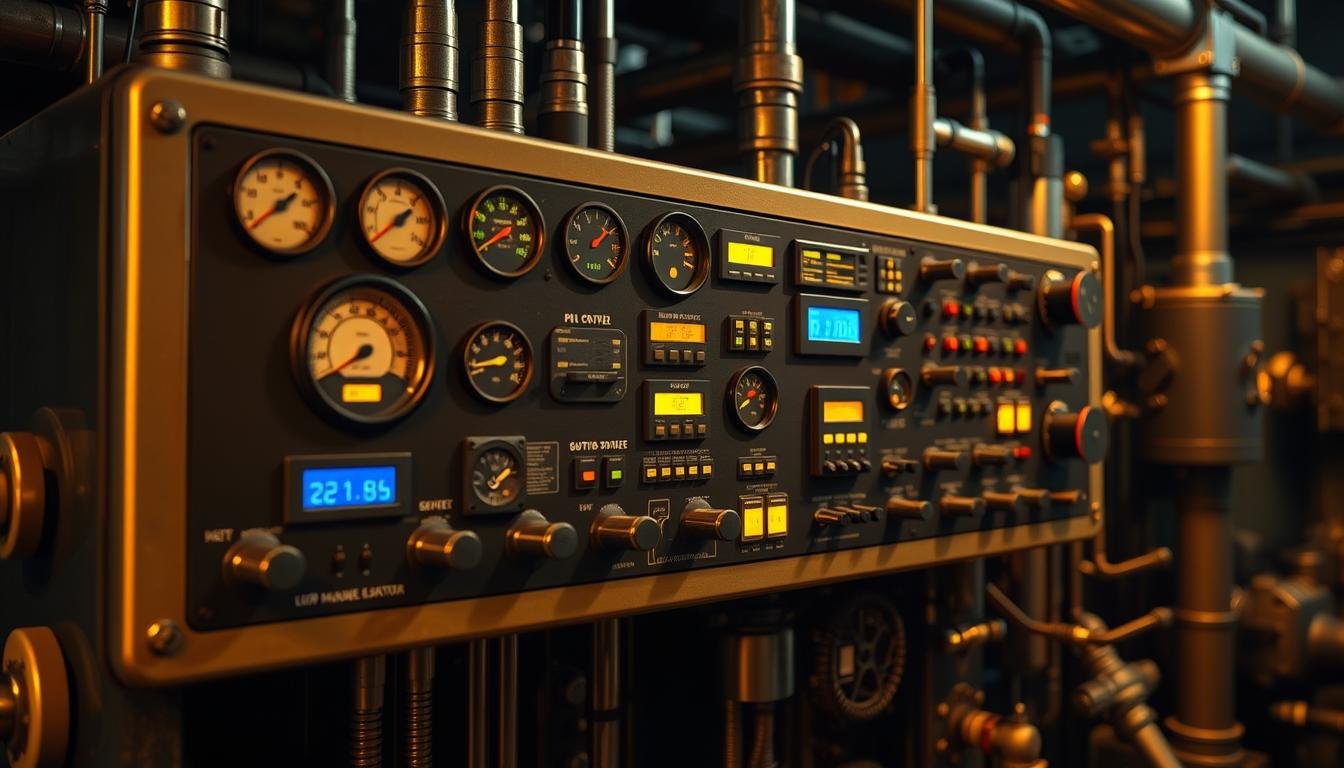I’m diving into the world of boiler control system engineering. This field involves designing, setting up, and keeping these systems running. They’re key in places like power plants, factories, and buildings that need heat.
Good boiler control is vital. It helps make things run better, safer, and more reliably. As I explore this area, I want to show how new control tech can boost performance. It helps achieve the best thermal solutions in industrial settings.
Understanding Boiler Control System Basics:
Boiler control systems rely on key components for efficient operation. Control logic is at the heart, using algorithms to keep temperature and pressure right. This ensures the boiler works safely and uses less energy.
Sensors are critical, providing real-time data on the boiler’s state. They track temperature, pressure, and flow rates. This info helps the control logic make the right adjustments. Actuators then carry out these changes, keeping the boiler running smoothly.
Feedback mechanisms also play a big role. They check if the boiler’s conditions match the set parameters. If not, the control logic acts fast to correct it. This keeps the boiler running reliably and safely.
Importance of Effective Boiler Control:
Effective boiler control is key for safety and efficiency. It helps use less fuel and cuts down harmful emissions. This makes our environment better and extends the life of boilers. I’ve seen how new control technologies save a lot of money over time.
Badly managed boilers can cause big problems. Issues like overheating and system failures can happen. But, with good control, these dangers are greatly reduced. This shows how important safety is in boiler operations.
Today, control systems are getting smarter. They use advanced technology to improve how things work. This change is not just about meeting safety rules. It also makes boilers work better and saves money.
Types of Boiler Control Systems:
Boiler control systems fall into two main types: manual and automated. Manual systems need people to adjust settings, which works well for small places. But, it takes more people and can be tiring.
Automated systems, on the other hand, use technology to control the boiler. This makes things faster and more accurate. It also means less human error, leading to better performance.
Looking into advanced control, I see PID control becoming popular. It helps manage things like pressure and temperature well. Fuzzy logic systems are great for handling uncertainty, and model-based control uses math to predict and adjust.
These advanced controls are used in many fields, from chemicals to power. They help make boiler work better and more reliable.
Boiler Control Strategies for Optimal Performance:
Effective boiler performance strategies are key to saving money and energy. Energy management is a top approach. It aims to use less fuel and waste less energy. By using real-time monitoring and data analytics, I can spot energy use patterns and make needed changes.
Combustion control is also essential. It involves adjusting air and fuel ratios for better burning. This improves heat transfer and cuts down on harmful emissions. Using oxygen trim control or feedback loops helps achieve this.
Real-world examples show how these strategies work. Places that use advanced energy management and combustion control see big savings. By watching performance metrics and making adjustments, I can keep the boiler running at its best.
Common Challenges in Boiler Control System Engineering:
In my work with boiler control systems, I’ve seen many challenges. One big problem is system reliability. These systems need to work well in all conditions, keeping things safe and efficient. If they don’t, it can cause big problems or even danger.
Getting sensors right is another big challenge. Sensors are key to keeping the system running smoothly by gathering important data. If they’re not set up right, the whole system can fail, leading to bad readings and less efficiency.
Fixing these issues needs a careful plan. Regular checks are key to finding and fixing problems early. Keeping up with new tech helps us meet changing rules and standards. By focusing on these areas, I can keep the quality of our boiler control systems high.
Future Trends in Boiler Control Technology:
The future of boiler control is looking bright, thanks to IoT applications. These smart systems allow for better monitoring and control. They collect and analyze data in real-time, helping us make quicker and smarter decisions.
Automation in the industry is also changing the game. With better data analytics, we can predict when maintenance is needed. This means less downtime and more efficiency. It also helps save money and protect the environment by keeping boilers running smoothly.
These changes are transforming how we handle industrial energy solutions. I’m excited to see how they’ll make systems more resilient and adaptable. It’s important for professionals to keep up with these advancements to stay ahead in their field.
